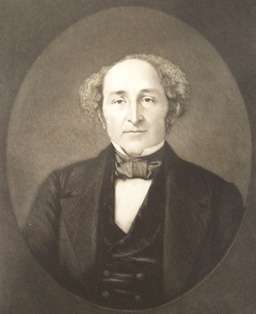Henry Louis Baugher

| Part of a series on |
| Lutheranism |
|---|
 |
|
Bible translators
|
|
Theologians |
| Lutheranism portal |
Henry Louis Baugher (July 18, 1804 – April 14, 1868) was an American Lutheran clergyman and academic. He was President of Gettysburg College from 1850 until 1868.
Background
Henry Lewis Baugher was born in Abbottstown, Pennsylvania to Christian Frederick and Ann Catharine Matter Baugher. His father was a tanner by trade and his paternal grandfather, John George Bager, was a pioneer German Lutheran pastor west of Pennsylvania’s Susquehanna River. As a youth, Henry was educated by the Reverend David McConaughy of Gettysburg.
Baugher entered Dickinson College in 1822 and was admitted to the Belles Lettres Literary Society that same year. He graduated as part of the nineteen-member Class of 1826, of which only nine earned a diploma. At the commencement ceremony, Baugher, who received secondary honors, gave the Latin Salutatory Address.[1]
After graduating from Dickinson, Baugher made arrangements to study law under Francis Scott Key, in Georgetown. After his mother's death, Baugher changed plans and entered the Princeton Theological Seminary in 1826. He studied there until 1828, when he transferred to the Lutheran Theological Seminary at Gettysburg where he stayed for one year and was licensed as a minister. In 1829, Baugher was married to Clara (Clarissa) Mary Brooks.[2]
Career
In 1831, Baugher became a teacher of classical studies at the Gettysburg Gymnasium, which was then under the Seminary. The Gymnasium became Pennsylvania College (now Gettysburg College) in 1832. Baugher was selected as professor of Greek and the Belles Lettres. He served in this position for 18 years, and also served as the Secretary for the Faculty of the College. He was ordained a Lutheran pastor in 1833. His brother, Isaac, became a College trustee in 1844 and gave the College its first bequest.[3]
In 1848, Henry Baugher received an honorary doctorate of divinity from his alma mater.[4] After College President Charles P. Krauth resigned his position in 1850, the Board of Trustees unanimously voted Baugher the second president of Pennsylvania College and later decided to build a home for him and his family. After initially rejecting the position, he accepted and assumed his duties in October of the same year, not to relinquish them until his death in 1868.[5]
Baugher’s presidency was noted by his stern disciplinary practices and high standards. According to E.S. Breidenbaugh, Baugher believed “that reverence for superiors, submission to authority, and obedience to the rules and regulations of the College were indispensable to the formation of a good character, he inculcated and enforced the duty of loyalty both by counsel and authority . . . [and] he was proficient in detecting those guilty of misdemeanors and violations of the college laws.”[6] According to Samuel Gring Hefelbower, Baugher’s severity was “tempered with Christian love.”[7]
On November 19, 1863, Henry Baugher gave the benediction at the ceremony opening the National Soldiers’ Cemetery at Gettysburg; speaking after Abraham Lincoln’s famous Gettysburg Address.[8] Henry Baugher died just shy of his 64th birthday. He had been suffering from an unknown disease for several years, caught a cold, and died ten days later. He is buried in the Evergreen Cemetery in Gettysburg, along with his wife.
References
- ↑ Dickinson College Alumni, 1826–1850 (Encyclopedia Dickinsonia, Dickinson College)
- ↑ The Pennsylvania College Book, 1832–1882 (E.S. Breidenbaugh, ed. Philadelphia: Lutheran Publication Society, 1882), 150.
- ↑ A Salutary Influence: Gettysburg College, 1832–1985. Vol. 1 (Charles H. Glatfelter. Gettysburg, PA: Gettysburg College, 1987), 82.
- ↑ Letter to William H. Allen, Esq. (Personal letter, July 19, 1848. Baugher Family Records, Manuscript Collect 034, Gettysburg College Archives and Special Collections, Musselman Library)
- ↑ A History of the Gettysburg College Campus (Gregory J. Landrey. Gettysburg College Archives and Special Collections, Musselman Library. 1977)
- ↑ Breidenbaugh, 150.
- ↑ The History of Gettysburg College, 1832–1932 (Samuel Gring Hefelbower. Gettysburg, PA: Gettysburg College, 1932), 138.
- ↑ Lincoln’s Gettysburg Address (Orton H. Carmichael. New York: The Abingdon Press, 1917)
External links
|